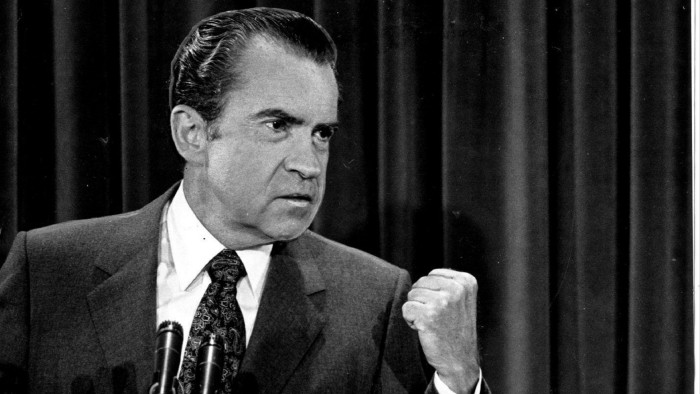Unlock the Editor’s Digest for free
Roula Khalaf, Editor of the FT, selects her favourite stories in this weekly newsletter.
The writer, an FT contributing editor, is chief executive of the Royal Society of Arts and former chief economist at the Bank of England
Panican: noun. A person or party that panics, overreacting to events in a weak and stupid way. Derogatory.
This neologism is barely a month old. There is an irony, a bigly one, that within a week of invention, its author (the US president) had himself become a card-carrying member of the Panican party. It took only 24 hours of bond market mayhem for “liberation day” to give way to “comeuppance quarter”, with a 90-day tariff pause.
Nonetheless, the question raised by the US president remains as relevant now as then. Has the reaction of financial markets, politicians and the media to his tariff announcements been excessive? Have the 24/7 catastrophisers in financial markets and the media, and a political class routinely declaring the world’s end, panicked?
The impact of tariffs, and in particular the fear of an unknown escalation in them, is in an important sense very much real. If an arms race took hold, a day of liberation could well presage a decade or more of hibernation in world trade and growth. The arc of trade history has, with alarming regularity, bent towards darkness.
Tariff shocks emanating from the US have occurred on a routinely half-century cycle for the past 250 years: 1789, 1828, 1890, 1930, 1971. Each left a lasting macroeconomic scar — in the penultimate case (the Smoot-Hawley tariffs) deepening the Great Depression, in the final case (the “Nixon shock”) triggering the Great Inflation. Both are remembered as great for the wrong reasons.
Half a century on, with world trade now both larger and significantly more interwoven, the scars from a 2025 tariff shock could be expected to be deeper still. The bloodstained economic forecasts of the past month attest to that, with a US recession now a coin-toss. So, too, in financial markets, with more than $6tn lost from global stock markets and implied volatilities having risen threefold.
On the other side of this argument, however, no one is today in any doubt that the cat’s cradle of global supply chains cannot be unravelled without years of re-engineering at catastrophic cost. The very inter-connectivity of world trade, and the costs of disconnection, are the best possible bulwark against tariff escalation.
The excess sensitivity of financial markets apply a double-lock. By telescoping and amplifying these costs, they serve as a real-time disciplining device on politicians claiming they can weather the short-term pain. This makes capitulation speedier than in the past. The Smoot-Hawley tariffs lasted four years, Nixon’s tariff’s four months. The worst of Trump’s tariffs lasted barely a week.
The tariffs could be re-escalated. But once bitten, twice shy. The past month leaves a US president as psychologically scarred and gossamer thin-skinned as the businesses and financial markets he has held in thrall. The irresistible force of self-importance helped cause the US tariff spike, but the immovable object of self-preservation will be its undoing.
For all the rhetoric of a new world order, then, the forces of global mean-reversion may in fact be stronger than ever. A new financial order was widely expected after the global financial crisis. Twenty years on we have seen some redirection of flows but no great unravelling. World trade may well follow a similar path, if anything fortified by recent events, perhaps even with China as its unlikely new champion.
Meanwhile, despite external expressions of dismay, the past month has been a political godsend for many world leaders. Trade war and talk of a new world order are breathing life into flagging and unpopular regimes (Xi Jinping in China, Emmanuel Macron in France, Vladimir Putin in Russia), providing oven-ready alternatives for new ones (Friedrich Merz in Germany, Mark Carney in Canada, Keir Starmer in the UK).
Yet tellingly, and with the exception of China, the escalation solemnly declared by many leaders has so far been largely semantic rather than substantive. We’ve had a month of reciprocal rhetoric rather than tariffs. If the forces of mean-reversion and self-preservation remain strong, long may (and will) that continue.
An epoch of de-globalisation is possible. Trump tariffs may yet mark a new trade chapter. More likely, however, the arc of history will bend back towards the light, with recent events as chapter footers not headers. What we have witnessed is a panic rather than a heart attack for the world economy — indeed, a self-stabilising one. In an over-anxious, rudderless era, the rise of the panicans may save us from ourselves.


